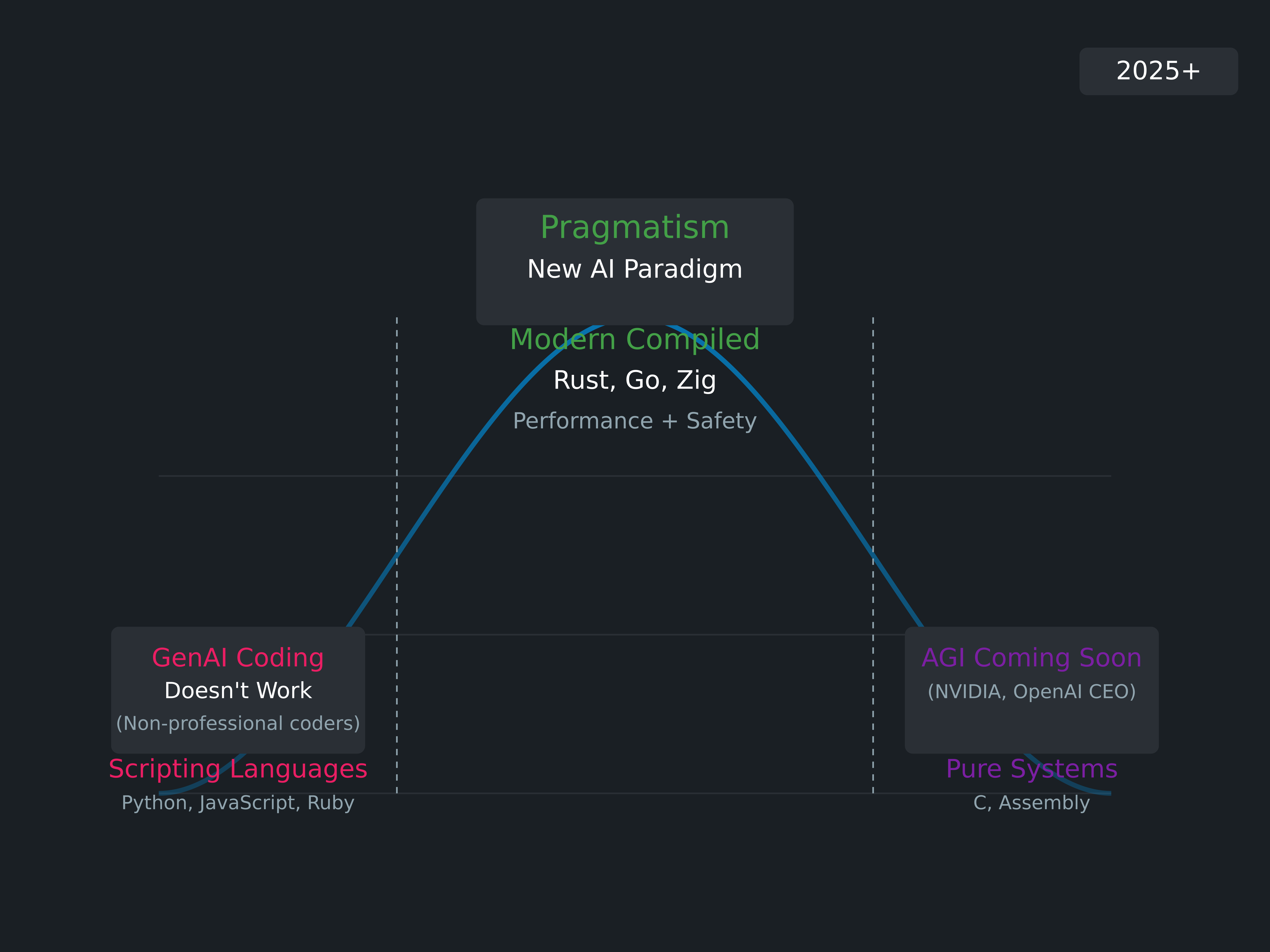2025+ Technology Paradigm Shifts: AI and Programming Languages
2025+ Technology Paradigm Shifts: AI and Programming Languages
Two major paradigm shifts are reshaping the technology landscape as we move into 2025 and beyond: the evolution of AI development approaches and the transition from scripting to modern compiled languages. These shifts represent fundamental changes in how we think about both artificial intelligence and programming language design. The cheese has moved, you cannot "believe in everything" or you believe in nothing.
Do you want to learn AWS Advanced AI Engineering?
Production LLM architecture patterns using Rust, AWS, and Bedrock.
Check out our course!
Understanding the AI Development Spectrum
The Skeptics: GenAI Coding Limitations
On one end of the spectrum, we find skepticism about GenAI's coding capabilities, particularly among non-professional developers. This perspective emphasizes the current limitations and reliability issues in AI-generated code, highlighting the gap between promise and practical implementation.
The Pragmatic Center: A New Paradigm
The dominant perspective recognizes AI as a transformative but evolving technology. This pragmatic approach acknowledges AI's potential while remaining grounded in its current capabilities and limitations, focusing on practical applications rather than speculative futures.
The Optimists: AGI Predictions
Major tech leaders, including executives from NVIDIA and OpenAI, represent the optimistic view that Artificial General Intelligence (AGI) is on the horizon. This perspective sees current developments as precursors to a more comprehensive AI revolution. The problem is the lack of credibility and financial incentive to promote hype.
The Programming Language Evolution
The Decline of Scripting Languages
Traditional scripting languages like Python, JavaScript, and Ruby, while still widely used, are showing signs of reaching their paradigmatic limits, particularly in areas requiring high performance or strong safety guarantees.
Modern Compiled Languages: The New Standard
The center of this shift focuses on modern compiled languages like Rust, Go, and Zig, which offer key benefits:
- Memory Safety: Built-in protections against common programming errors
- Performance: Near-native execution speed with minimal overhead
- Concurrent Design: First-class support for modern parallel computing
- Modern Tooling: Integrated development environments and robust package management
Pure Systems Programming
At the other end, traditional systems languages like C and Assembly maintain their role in low-level programming, though their domain is increasingly narrow and specialized.
Key Benefits of These Shifts
- Improved Reliability: Modern compiled languages provide better safety guarantees
- Enhanced Performance: Closer to metal execution while maintaining safety
- Future Readiness: Better positioned for emerging computing paradigms
These parallel shifts in AI and programming languages reflect a broader evolution in software development, where reliability, safety, and performance are becoming increasingly critical. As we move into 2025 and beyond, these trends suggest a future where development tools and practices are both more powerful and more rigorous.
Implications for Developers
Skill Development Priorities
- Learn Modern Compiled Languages: Invest time in Rust, Go, or Zig
- Understand AI Tool Integration: Master AI-assisted development workflows
- Focus on Systems Thinking: Understand performance and safety implications
Career Considerations
- Traditional scripting roles may require upskilling
- AI tool proficiency becomes essential
- System-level understanding increasingly valuable
Recommended Courses
Based on this article's content, here are some courses that might interest you:
-
AWS Advanced AI Engineering (1 week)
Production LLM architecture patterns using Rust, AWS, and Bedrock. -
Enterprise AI Operations with AWS (2 weeks)
Master enterprise AI operations with AWS services -
Natural Language AI with Bedrock (1 week)
Get started with Natural Language Processing using Amazon Bedrock in this introductory course focused on building basic NLP applications. Learn the fundamentals of text processing pipelines and how to leverage Bedrock's core features while following AWS best practices. -
Natural Language Processing with Amazon Bedrock (2 weeks)
Build production NLP systems with Amazon Bedrock -
Generative AI with AWS (4 weeks)
This GenAI course will guide you through everything you need to know to use generative AI on AWSn introduction on using Generative AI with AWS
Learn more at Pragmatic AI Labs